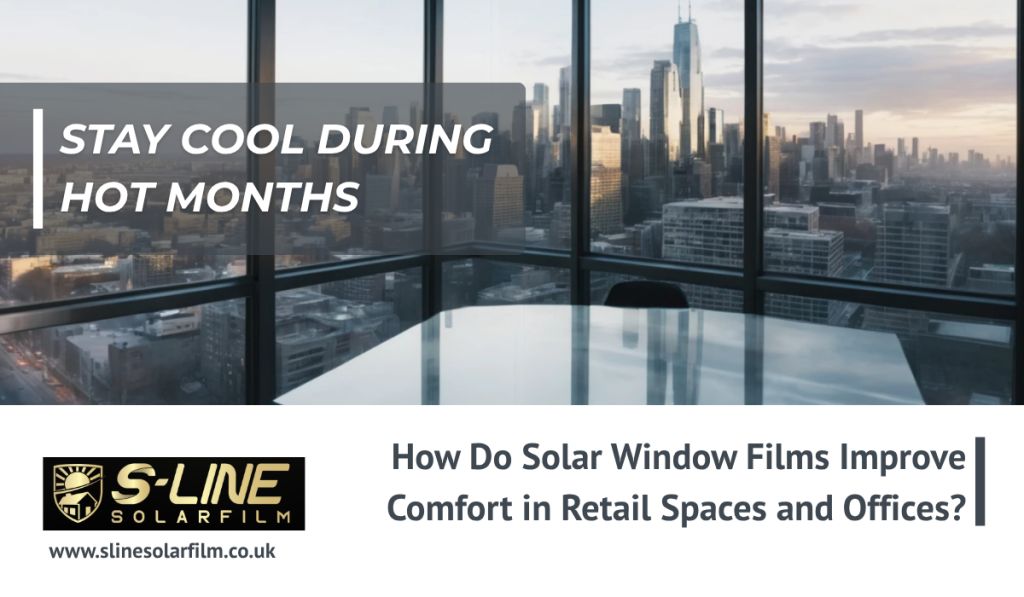Windows play a crucial role in creating bright, open, and inviting workspaces. While natural light can boost employee performance and improve the overall atmosphere, it can also bring unwanted heat, glare, and harmful UV rays – all issues that can make offices and retail spaces feel uncomfortable, raise maintenance costs, and reduce productivity.
Solar window films in London provide an efficient and cost-effective solution, helping businesses save up to 50% on their annual energy bills. They are a smart investment for companies looking to improve comfort, protect interiors, and foster a positive, productive environment.
What Are Solar Window Films?
Solar films are thin, transparent layers applied to windows to control heat, light, and UV exposure. They act as a protective barrier, improving comfort and energy efficiency without changing a building’s appearance.
These films work by absorbing, reflecting, or diffusing solar energy, keeping interiors cooler in summer and warmer in winter.
Common types include:
• Reflective Films – Reduce heat and glare, ideal for commercial spaces.
• Neutral Films – Natural glass look with heat and UV protection.
• Low-Emissivity (Low-E) Films – Improve insulation year-round.
• Spectrally Selective Films – Block infrared heat while letting in visible light.
• Ceramic Films – Durable, non-reflective, excellent heat rejection.
Most solar films block up to 99% of harmful UV rays and can last over a decade, offering a cost-effective way to boost comfort and protect interiors.
Here’s How Solar Window Films Increase Comfort in Offices and Retail Spaces:
Windows bring natural light and openness, but they can also introduce heat, glare, and UV exposure; factors that affect comfort, productivity, and energy costs. Solar films provide a simple, cost-effective solution to these challenges.
Stay Cool During Hot Months
Excess heat from sunlight can make offices and retail areas uncomfortable and overwork air conditioning systems. Studies show that temperatures above 27°C can reduce office productivity, with higher heat levels causing bigger drops. Solar films block a large portion of solar heat before it enters, often lowering indoor temperatures by 2–5°C in peak summer.
Lower temperatures mean AC systems run less, cutting energy use by 30–50% and reducing wear on equipment. Employees stay focused, and customers enjoy a consistently comfortable environment.
Better Insulation in Winter
Solar window films in London aren’t just for summer. Low-emissivity (Low-E) films help retain indoor heat, reflecting warmth into rooms and reducing thermal transfer by up to 44% on single-pane windows and 32% on double glazing. The result? Fewer cold spots, less strain on heating systems, and a cosier workspace that keeps employees and visitors comfortable year-round.
Reduce Glare for a Productive Environment
Harsh glare from sunlight can cause eye strain, headaches, and distractions in offices, while in retail, it can make product displays harder to see. Solar films filter out glare while keeping natural light flowing, creating bright, open spaces without discomfort.
Protect Against UV Damage
UV rays fade furniture, carpets, artworks, and merchandise. Even double-glazed windows allow up to 40% of UV rays in. Solar films block up to 99% of harmful UV rays, extending the life of furnishings and reducing replacement costs. They also help protect skin, making workspaces healthier and safer.
Balance Light and Privacy
Large windows can raise privacy concerns in offices and street-facing retail spaces. Solar films let natural light in while limiting visibility from outside. Some films offer one-way privacy, perfect for executive offices, meeting rooms, or display areas, all without costly renovations.
Solar Films: A Smart Upgrade for a More Comfortable Workspace
S-Line Solarfilm’s window films in London help control sunlight, temperature, glare, UV rays, and privacy—making them a practical upgrade for any office or retail space aiming for a comfortable and productive environment.
Easy to install and cost-effective, these films improve energy efficiency while protecting interiors, creating an enjoyable workspace for employees and customers alike. Plus, with their Autumn Sale offering 10% off on window film supply and fitting, there’s never been a better time to invest in a smarter, more comfortable workspace.
Frequently Asked Questions
The cost of window film installation depends on factors like window size, type, and the chosen film. On average, tinting a home window ranges from £200 to £400 per window, with most individual window installations costing around £300.
Window film may have an upfront cost, but the long-term benefits, including lower energy bills, protection for interiors, and improved security, make it a cost-effective investment for homes and offices alike.
High-quality window films in London typically last 10 to 20 years. Residential films often last longer than commercial ones due to lower sun exposure and less frequent use, providing long-term protection and performance.
Yes, if it’s brighter inside than outside, such as when lights are on, people may see through the window film from the outside. Exterior visibility depends on the difference in lighting. Many people opt to pair window films with curtains or blinds for nighttime privacy.
Window film can block sunlight, especially solid-colour vinyl films. Available in shades like black or white, these films reduce heat and light while providing privacy and protection for interiors.
Reflective films can reduce privacy at night, as interior lighting makes it easier to see inside. Non-reflective films, in contrast, maintain privacy consistently regardless of lighting conditions.
For security purposes, window films in London between 8 mil and 14 mil are generally recommended, providing effective protection while maintaining clarity and performance for residential and commercial applications.
Applying window film incorrectly on double-pane windows can trap heat between the panes, risking thermal stress, seal damage, and premature failure of the window unit.
For heat and glare reduction, exterior installation is best. For cost-effectiveness and longevity, interior installation works well. Some films are specially designed for either interior or exterior use, depending on your needs.
Adhesive window films in London are generally more durable and long-lasting than static cling films. They resist peeling or bubbling and can withstand extreme temperatures and humidity, making them ideal for both residential and commercial use.

